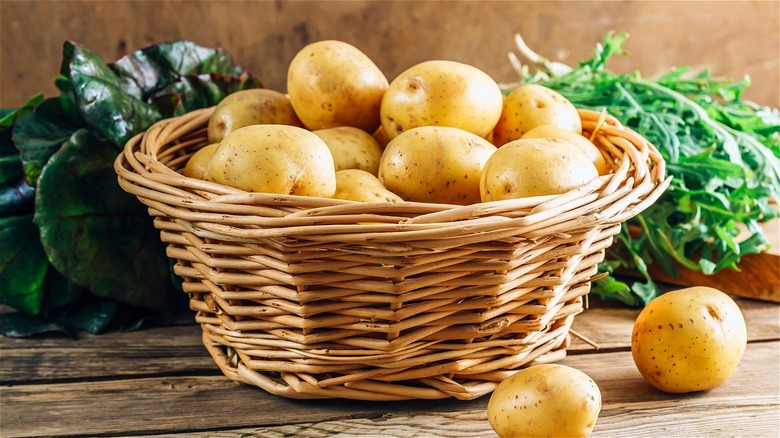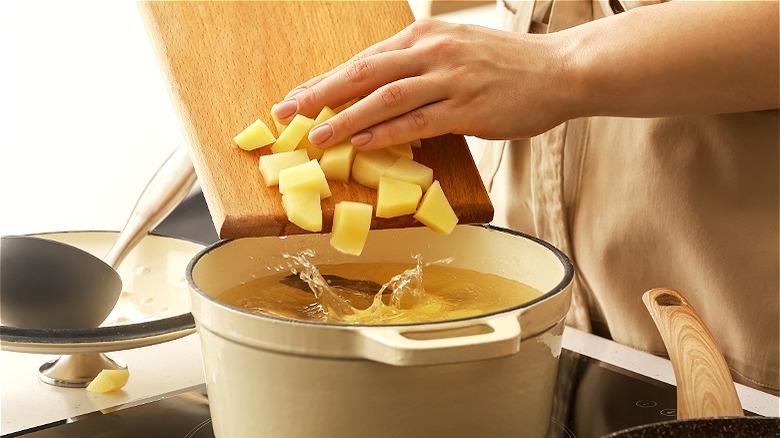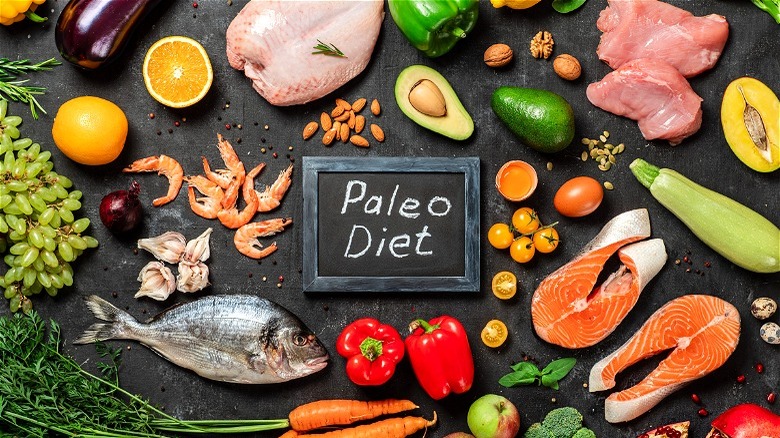Can You Eat Potatoes On A Paleo Diet?
Mayo Clinic describes the ever-popular paleo diet from a "less is more" perspective: followers simply cultivate newfound eating habits based on the hunter-gatherer way of life. Paleo dieters strive to eat the same foods as prehistoric humans did 10,000 to over 2 million years ago, adhering strictly to the cardinal rule of no processed or packaged foods. According to UC Davis Health, the paleo diet is anchored to the premise that mass-produced agriculture has led to an overall decline in human health.
Though, if you're trying to mirror your daily food intake from someone living in the Stone Age, what does that look like exactly? First off, The New York Times claims there is not one regimented paleo diet. What exactly prehistoric humans ate is hard to pin down based on a vast range of factors including but not limited to food availability and weather restrictions.
While differences also existed based on people's geographic location, there are primary foods paleo followers agree to regularly consume. If you've ever wondered if it's possible to eat too many vegetables, put that thought on the back burner since vegetables are a safe food for dieters. Healthline claims that meat, fish, fruit, nuts, herbs, and healthy oils are also acceptable foods with the paleo diet. But what about potatoes? Yes, potatoes are a vegetable but they're regularly considered a carbohydrate due to their starchy makeup, per Cleveland Clinic. Can you eat potatoes on a paleo diet?
For some health experts, potatoes are paleo-approved
Unfortunately, there is no one-size-fits-all answer for potatoes. While the paleo diet is not considered mostly carbohydrate-free like the keto diet, says registered dietitian nutritionist Jennifer McDaniel, via Everyday Health, people following the paleo diet naturally consume fewer carbohydrates due to the exclusion of processed carbs and refined grains.
According to Potatoes USA, potatoes are naturally high in carbohydrates, with one 5.2-ounce potato containing 26 grams. Because the roots are digested fast and carry a high "glycemic load", Harvard T.H Chan School of Public Health refuses to add potatoes to its list of healthy vegetables, making them a controversial food for paleo eaters.
But in 2016, the Paleo Foundation conducted extensive research on the white potato, tracing its roots to South America over 13,000 years ago (before commercialized farming) and compared the various methods potatoes are consumed in present-day cultures. The foundation concluded that white potatoes are natural whole foods, despite their high starch content and often unhealthy preparation methods.
With minimal processing (including skin) white potatoes can be enjoyed on a paleo diet, per Healthline. UC Davis Health claims that potatoes provide many nutritional benefits including high counts of potassium and vitamin C. The claims against potatoes may have initially caused you to question the health benefits of carbohydrates, yet some experts suggest the exclusion of certain foods may be doing more harm than good.
Banning particular foods on the paleo diet may be harmful to your health
Despite the many protein-packed vegetables available in the world, one of the most affordable options high in vitamins and minerals is not allowed on the paleo diet. Legumes, which include beans, lentils, split peas, and peanuts are restricted based on the arguments against lectins or anti-nutrients, per Clean Eating.
Yet, Harvard T.H. Chan School of Public Health claims the harmful effects of lectins have been found primarily in raw beans, and that soaking and proper cooking reduce any detrimental effects lectins may have on the human body. In fact, eating foods containing lectins aid in the proper digestion of carbohydrates.
According to The Cooper Institute, many paleo followers also avoid whole grains because they increase potential inflammation in the body. These unfounded claims may be trumped by the slew of health benefits whole grains provide, which include reduced risk of heart disease and stroke, via Oldways Whole Grains Council.
Harvard T.H. Chan School of Public Health warns dieters that the exclusion of foods like dairy and whole grains can lead to vitamin D and B deficiencies as well as a complete lack of calcium. If you're considering the paleo way, make sure to conduct your own research before deciding what's best for your overall health.


